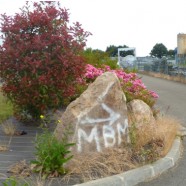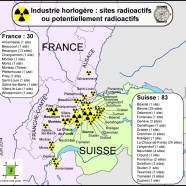“On the Trail” n°5
We are pleased to announce the publication of the 5th edition of « On the Trail », Information and analysis bulletin on animal poaching and smuggling.
1st April – 30th June 2014. 132 pages, 506 events.
Sea cucumbers, corals, marine mollusks and fishes, pages 3 to 10
English version (pdf 7,2 Mo):
https://robindesbois.org/wp-content/uploads/ON_THE_TRAIL_5.pdf
Numerous messages have been sent to Robin des Bois from Africa, Asia, Europe and the American continent. They come from Custom officers, CITES delegates, governmental institutions, Non-Governmental Organizations and from the general public. They all testify to the usefulness of “A la Trace” and the English version “On the Trail”, », Information and analysis bulletin on animal poaching and smuggling.
No to Discordia
Subject : towage of the Costa Concordia
Robin des Bois welcomes the achievement of operation Concordia. The NGO believes that is possible to tow the wreck with minimal risks. The final destination which was ultimately decided by the Prime Minister of Italy Mr. Matteo Renzi reinforces Robin des Bois’ positive assessment. Genoa was once an important ship-breaking yard for vessels at the end of their life and was, amongst all the options evoked over the last year, the most logical option with the best safeguards for a positive end to the demolition of the Concordia.
No to Discordia
Subject : towage of the Costa Concordia
Robin des Bois welcomes the achievement of operation Concordia. The NGO believes that is possible to tow the wreck with minimal risks. The final destination which was ultimately decided by the Prime Minister of Italy Mr. Matteo Renzi reinforces Robin des Bois’ positive assessment. Genoa was once an important ship-breaking yard for vessels at the end of their life and was, amongst all the options evoked over the last year, the most logical option with the best safeguards for a positive end to the demolition of the Concordia.
Australian waste: Divergence between Robin des Bois and the French Ministry of Environment
Robin des Bois regrets that the French Ministry of Environment decided to refuse the importation of 132 tonnes of chemical waste from Sydney, Australia.
The NGO worked over numerous months with Orica, holder of the waste, and with Trédi, disposal contractor of hazardous waste, to develop a method of operation likely to unblock an inextricable situation in Australia and to reduce, to a minimum, maritime transport risks.
Unfortunately, the Ministry of Environment joined the gang and shares certain caricatures of French and international environmentalist, by not taking into account the benefits of the plan well thought out by Robin des Bois, Trédi and Orica. (cf. Robin des Bois’ viewpoint on the importation of HCB from Australia to France. June 16, 2014)
Destruction of Syrian Chemical Weapons (n°5)
According to the Organisation for the Prohibition of Chemical Weapons (OPCW) the most challenging phase towards the destruction of Syrian chemical weapons has just ended with the removal of the last declared precursors and other chemicals from Syrian soil. This first step was constantly delayed in spite of a good knowledge of the associated risks and the participation by numerous State Parties of the OPCW Convention.
However, the next step will enter into unknown territory. The plan is to neutralise 20 metric tonnes of mustard agent and 540 metric tonnes of sarin precursor at sea.
Destruction of Syrian Chemical Weapons (n°5)
According to the Organisation for the Prohibition of Chemical Weapons (OPCW) the most challenging phase towards the destruction of Syrian chemical weapons has just ended with the removal of the last declared precursors and other chemicals from Syrian soil. This first step was constantly delayed in spite of a good knowledge of the associated risks and the participation by numerous State Parties of the OPCW Convention.
However, the next step will enter into unknown territory. The plan is to neutralise 20 metric tonnes of mustard agent and 540 metric tonnes of sarin precursor at sea.
Robin des Bois’ viewpoint on the importation of HCB from Australia to France
Robin des Bois was consulted by Orica over the possible treatment, at Trédi’s incinerator at Salaise-sur-Sanne (France), of HCB waste stockpiled, since 1991, in Botany situated 8km from Sydney. Two representatives from Robin des Bois gathered information on site at the end of 2013 in order to understand why an industrial firm, located in Australia, an economically developed country, would want to export waste 17,000km away.
It was noted that the 13,800 tonnes of waste is stockpiled in a highly urbanised area. The Botany stockpile is exposed to natural and industrial external threats. The HCB concentration of the stockpile ranges from 0.003% to 89%. Certain waste requires repackaging every 4-5 years. Repackaging operations increase the total weight of the waste by 2.0% on average, per annum. Orica’s stockpile is historical and HCB is no longer produced in Australia.











